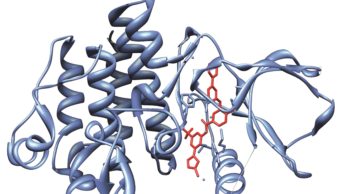
Dennis Kunkel Microscopy / Science Photo Library
The deposition of beta-amyloid (Aß) in the brain is thought to play a critical role in the development of Alzheimer’s disease (AD). But attempts to develop effective therapies against Aß have so far been unsuccessful in humans.
In a phase I trial, reported in Science Translational Medicine
[1]
(online, 2 November 2016), researchers studied the effects of verubecestat — a molecule that inhibits the enzyme required for Aß production — at three different doses in 32 people with mild or moderate AD.
After seven days of treatment, the team noted that verubecestat reduced levels of Aß in the cerebrospinal fluid by up to 84% with the highest dose, and there were no serious adverse events.
Verubecestat is already in two phase III trials and the researchers say it could become a much-needed disease-modifying treatment for AD if it can demonstrate an effect on the cognitive and functional symptoms.
References
[1] Kennedy ME, Stamford AW, Chen X et al. The BACE1 inhibitor verubecestat (MK-8931) reduces CNS b-amyloid in animal models and in Alzheimer’s disease patients. Science Translational Medicine 2016; 8: 363ra150. doi: 10.1126/scitranslmed.aad9704


